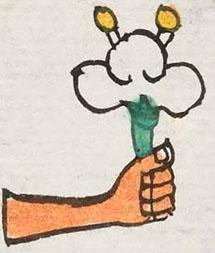Xochichiuhcan (Mdz27r)
This is nearly a simplex glyph, but it does have two visual components, so we are calling it a compound. It represents the place name Xochichiuhcan, with a flower (xochitl) and a horizontal arm and (left) hand holding it. The white petals of the flower are tripartite. Two small yellow circles at the ends of stamens appear above the petals. The stem of the flower is green. The arm and hand are a terracotta color.
Stephanie Wood
The hand seems to suggest the role of human action in creating the flowers, in order words, cultivating them. The verb chihua, to make or do, when truncated for combining, is "chiuh," which fits the place name as expressed in the gloss. The -can locative suffix is not shown visually.
Glyphs for flowers are often highly detailed and colorful. The attention to detail and color attest to the high value placed on flowers. The two small circles at the top of this flower, the leaves, and the roots are all hallmarks that will recur with some frequency, but, naturally, this element can also be abbreviated in some compound glyphs (e.g. the example, below, from 23 recto), and it will absorb European depictions of flowers (emphasizing stem, leaves, and largely round flowers) over time. Prior to contact, flowers appeared on temples and palaces, they were cultivated in gardens (showing horticultural expertise), they were associated with a ritualized warfare, worn as necklaces and garlands, and, for these reasons and more, they were the subject of poetry. Mexicolore has a short article about the Nahuas' fondness for flowers.
Stephanie Wood
xochichivca. puo
Xochichiuhcan, pueblo
Stephanie Wood
c. 1541, or by 1553 at the latest
Stephanie Wood
hands, arms, brazos, manos, flores, nombres de lugares

xochi(tl), flower, https://nahuatl.wired-humanities.org/content/xochitl
chihua, to make, cultivate, https://nahuatl.wired-humanities.org/content/chihua
-can (locative suffix), https://nahuatl.wired-humanities.org/content/can-2
ma(itl), hand or arm, https://nahuatl.wired-humanities.org/content/maitl
Codex Mendoza, folio 27 recto, https://digital.bodleian.ox.ac.uk/objects/2fea788e-2aa2-4f08-b6d9-648c00..., image 64 of 188.
The Bodleian Libraries, University of Oxford, hold the original manuscript, the MS. Arch. Selden. A. 1. This image is published here under the UK Creative Commons, “Attribution-NonCommercial-ShareAlike 3.0 License” (CC-BY-NC-SA 3.0).


